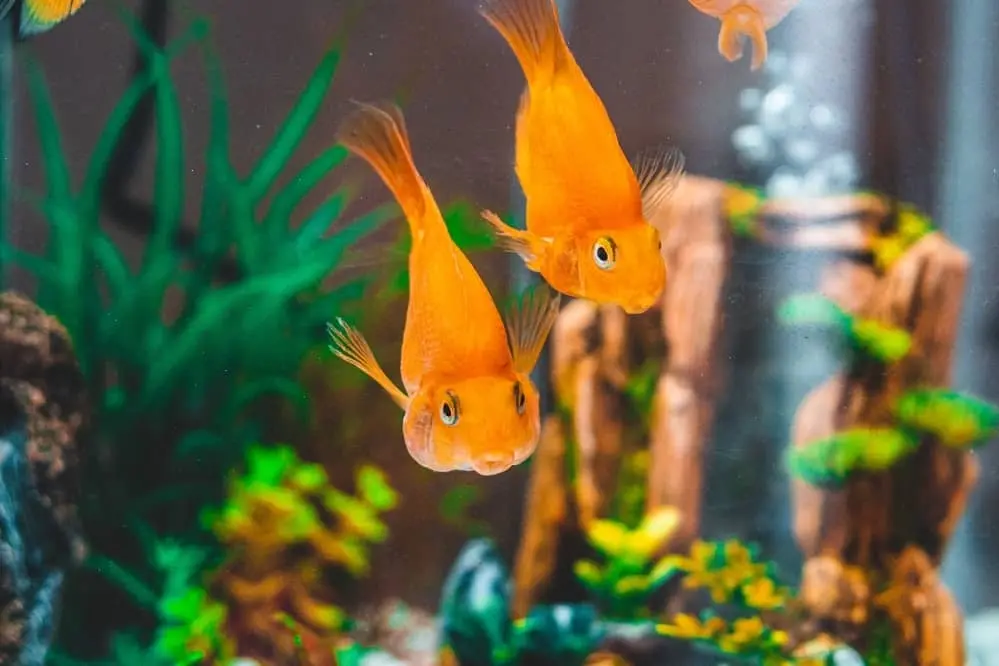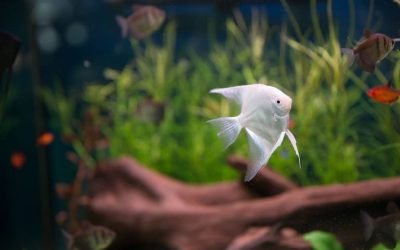7 Signs of Happy and Healthy Fish

Fish are the third most popular pet across the United States. Owners of fish love these small creatures with their individual personalities, and proclaim that it’s great they don’t have to walk them every day. While fish don’t need as much training as a dog for instance, they do require a good amount of care to remain happy and healthy.
Fish can be found in aquatic environments all across the globe. With endless amounts of water to swim in, you may be wondering, “Are fish happy in tanks?” When fish are given ample room to roam and play in a healthy environment, they can be perfectly happy in a tank.
1. Swimming Patterns
If your fish are swimming about freely and energetically, you can be certain that they are happy. While some fish love to dwell at the bottom of a tank or latch onto the sides of an enclosure, most fish will swim anywhere and everywhere they can.
The standard recommendation for an aquarium is a tank that is at least five gallons. Vessels smaller than five gallons such as fish bowls are far too small for any breed of fish. When fish are restricted in their movement, they will become depressed and fail to thrive. They will not grow to their full potential and often die much sooner than their life span predicts.
A goldfish kept in a bowl will only live for two or three years, while their average life span is 10 to 15 years.
2. Eating Patterns
Fish that are happy will gladly eat. Varieties of fish that are not bottom dwellers will swim to the surface promptly at meal time. If you notice your fish are slow to react when food is placed in their tank, they may be unhappy and have a decreased appetite.
Bottom feeding fish such as Plecos, Loaches, and Catfish will not rush to the surface for food as they are accustomed to waiting for it to filter down and land near the bottom of the tank. If your tank has a buildup of algae, your cleanup crew fish may be full by the time their daily meal comes around.
3. Fish Are Unafraid
Fish that are not fearful of one another will live longer, happier lives. Signs of fear could be cowering in corners or under rocks, avoiding other fish, or shying away from any stimulus.
Observe your fish and their interactions closely. It’s very common for fish to play around like human children do, but when the playfulness begins to stray toward bullying, it may be time to separate your aggressive fish.
Aggressive fish should be isolated from others to prevent injury to themselves and their tank mates. You can re-home the fish, or just get it its own tank.
4. Breathing Normal
One of the easiest ways of how to tell if your fish is stressed is to observe their breathing patterns. Fish suck in water through their gills. As the water passes many small blood vessels, oxygen is carried into the bloodstream, while carbon dioxide flows out of the fish’s body and into the water.
As bodily activity increases, oxygen intake has to increase as well. If your fish has just done several laps around its tank, it is perfectly normal for its gills to be flexing rapidly, or its mouth opening and closing to help draw water into its body.
However, if you notice that your fish is constantly hyperventilating, they are stressed. Their health may be in grave danger. Look around the tank for causes of stress. Is the fish being antagonized by another? Is the water clean and free from odor? Are they getting enough food?
5. Coloring
Fish have many different varieties and each variety has its own color palette. If your fish begins to drain its color, you’ve got some serious problems.
The most common cause for color change in a fish is stress. This stress can be caused by a lack of space, lack of sunlight, or general unhappiness with new surroundings.
Fish can suffer from fungal infections when the fungi actually grow on the surface of the fish, giving their scales a white or grey cast.
If your fish is vibrantly colored, or is becoming more colorful as they relax in their environment, you can rest easy. Small variations in hue are normal for many fish over their lifetime. If there are drastic color changes over a short period of time, then you should worry.
6. General Appearance
Signs of trauma on a fish such as lacerations or torn fins are a good indicator that they are under stress. These injuries could occur from fights with other fish, or the fish may have caused them itself.
When a fish is scared or depressed, they tend to hide in dark spaces. Sometimes, these spaces can prove to be dangerous as they get trapped under structures. Freeing themselves from these tight corners could cause their fins or scales to rip away.
Bulging eyes are an adorable feature on Bubble Eye Goldfish, but they are cause for concern in other species of fish.
7. Life Expectancy
The average life span of fish in a domestic aquarium is three to seven years.
When you find that fish are dying off quickly, you need to dissect any problems there may be with your aquarium. Do your fish have enough room? Is the water filtration system working adequately? Are the fish getting enough light?
Fish that live three years or longer are guaranteed to have lived happy lives, and you can be confident that they crossed the rainbow bridge with a smile on their face.
Final Thought
When you purchase fish as pets, it is imperative that you conduct research on how to properly care for them. Different fish have different needs and come with their own personalities. If you want variety in your aquarium, pick types of fish that have similar needs and wants. You can’t expect to create an environment that suits any type of fish you chuck into the tank.




0 Comments